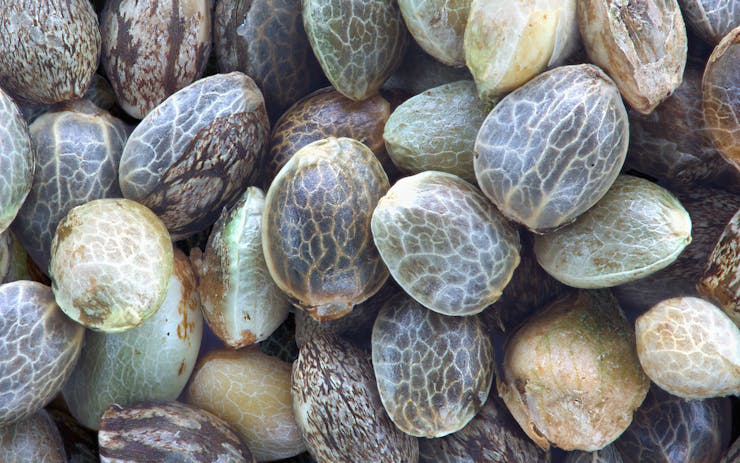Cali bud could end up on the East Coast easier than you think.
Cannabis commercial and home growers alike may be able to get their seeds from all over the country now, and not have to worry about breaking federal law. Before, because of federal illegality, cannabis seeds have been restricted to the state in which they were produced, so a strain bred and grown in one state, legally, could not go beyond that state’s boundaries.
A recent legal clarification by the federal Drug Enforcement Administration (DEA) could mean that the seeds of cannabis strains popular in one part of the country could legally be shipped to another part of the country, because the DEA considers all forms of cannabis seeds to be federally legal hemp.
That means strains popular in mature markets like Washington, Oregon, and California could make their way to legal markets on the East Coast in Massachusetts and Maine, and soon-to-open markets like New Jersey and New York.
Marijuana Moment reporter Kyle Jaeger recently unearthed a letter from DEA officials that clarifies the definition of cannabis seeds, clones, and tissue cultures, which could open up a whole range of possibilities for cannabis growers, and could spread a diversity of strains across legal markets all over the country, opening up the gene pool and leading to new trends and tastes in weed.
Are weed seeds illegal?
Right now, cannabis strains are somewhat isolated in the regions they are bred and created, as they can’t be transported beyond state lines. For example, even though recreational weed is legal at the state level in both California and Oregon, moving a plant from one of those states to the other is illegal at the federal level. This forces cannabis growers and breeders to operate within the confines of a specific state.
That’s not to say that a strain bred in California won’t end up in Oregon—it happens all the time, but it is technically illegal, according to federal law.
Many cannabis breeders and seed banks sell seeds throughout the US, but they operate in a legal gray area. Typically, seed producers say their seeds are sold for “novelty” or “souvenir” purposes, giving them a loophole to skirt the law.
If cannabis seeds are found in the mail, they could be seized and the sender or receiver arrested, however, the fact of the matter is that seeds are very difficult to detect. Cannabis seeds are usually less than a ¼” in diameter and don’t smell like weed. A packet of 10 seeds is about the size of four quarters stacked.
But all that might have changed in 2018 without anyone knowing.
Defining ‘source’ vs. ‘material’
In 2018, Congress passed a farm bill that legalized hemp in the US. It defined “hemp” as any cannabis plant with less than 0.3% THC. This allows hemp to be grown and used for industrial purposes—for creating textiles and materials. The 2018 bill also opened up hemp production for the creation of cannabinoids other than delta-9 THC, such as CBD, delta-8, and others.
Shop highly rated dispensaries near you
Showing you dispensaries nearBecause CBD and delta-8 products are usually extracted from hemp plants, that is, cannabis plants containing less than 0.3% THC, they can be found in states that don’t have legal, recreational cannabis.
In November, Shane Pennington, counsel at Vicente Sederberg LLP in New York, wrote to DEA officials asking for clarification of the definition of a cannabis seed, clone, and tissue culture.
Cannabis seeds have always been deemed illegal because they come from plants that are high in THC. The source of the seeds is above 0.3% THC, and therefore anything that comes from those plants, such as seeds, has also been considered illegal cannabis.
Pennington argued that the source of the material doesn’t determine legality, but the material itself—meaning that because a cannabis seed itself contains less than 0.3% THC, it should be classified as hemp. If seeds are hemp, they are not a controlled substance—and are therefore federally legal.
“When it comes to determining whether a particular cannabis-related substance is federally legal ‘hemp’ or schedule I “marihuana,” it is the substance itself that matters—not its source,” Pennington wrote in a blog post.
Exotic Genetix Mike, founder of cannabis producer Exotic Genetix, said the DEA’s ruling “Is what we’ve always kind of practiced. [Seeds contain] less than 0.3% THC—they’re not a controlled substance.”
Mike welcomed the news: “It’s been clarified. Not just what we do is legal, but the money we make for doing it is also legal and not an illegal enterprise.”
What implications does this have for the weed industry?
If the DEA and federal government allow seeds to cross state lines, adults could grow and consume seeds and strains from all over the country in their own state. Certain strains would no longer be confined to a specific region, but could be enjoyed all across the nation.
“It’ll spark innovation, if people can bring it above ground, it can be regulated,” said Pennington in an interview with Leafly.
Regulation can bring more investment, a bigger industry, and more acceptance of the plant.
Breaking down transportation barriers across states would also open up the cannabis gene pool, giving breeders a bigger diversity of strains to work with. The number and diversity of new strains would likely increase, tapping into new consumer trends and flavors.
More strains also means that certain strains could be pinpointed and bred specifically for certain effects, whether for medical or recreational purposes.
But according to Pennington, perhaps the biggest implication is that “This sends a signal, clearly, to state legislators, state regulators, and to groups that lobby those folks… the federal law is more flexible than you assumed.”
States take their cue from the DEA when creating their own drug laws, so seeing the agency relax its stance on shipping cannabis genetics could cause states to follow suit, breaking down protectionist state laws.
This could also open up more accurate research on the plant, according to Pennington. For decades, cannabis research was limited to The University of Mississippi, which grew weed with a low potency, around 8% THC. However, most dispensaries sell cannabis with a THC percentage around 20%. Being able to ship genetics across the country would allow for more robust research into the plant, using strains that mirror what adults are actually buying in stores and consuming.
How binding is the DEA letter?
The DEA calls the letter an “official determination,” but whether or not they are legally bound to this position is a bit hazy.
“That to me sure seems like something the agency would either be bound to going forward or at least be very hesitant to deviate from in any kind of enforcement context,” said Pennington.
For now, the DEA’s acknowledgment that cannabis seeds, clones, and tissue cultures are not controlled substances isn’t law, but it is a big step forward in relaxing restrictions on cannabis.





